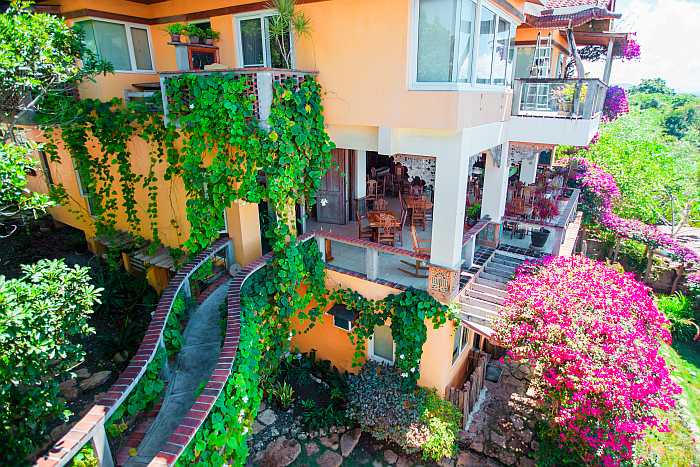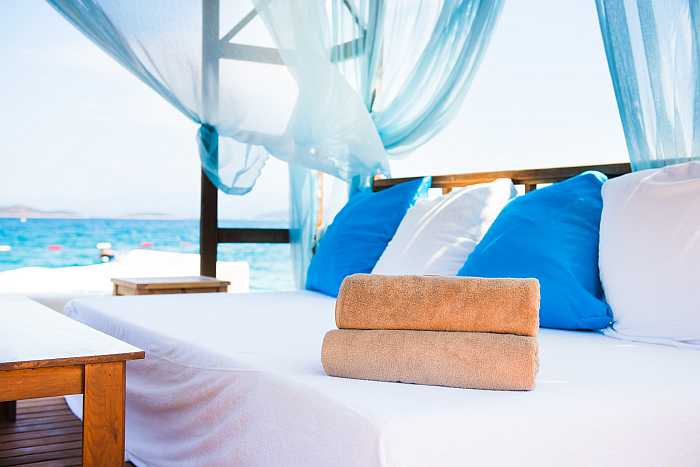
Tropical resort (Photo: Shutterstock)
As Passover approaches, the question on many travelers' minds is where to spend the holiday. For those observing Pesach, the choice between a sprawling resort and a cozy boutique hotel is more than just about accommodation – it's about creating the perfect Passover experience. Let's explore what each option has in store for you, from space and privacy to amenities, cost considerations, and location accessibility, ensuring your Pesach vacation is not just a getaway but a truly enriching experience.
Space and Privacy
Big Resorts: These establishments are not just accommodations; they're almost like self-contained worlds. With their expansive grounds, you have the freedom to roam and explore a variety of environments - from lush gardens to sprawling poolsides. This sense of space is one of the biggest draws of large resorts. It means that even when the resort is at full capacity during busy periods like Passover, there are still plenty of corners to find solitude if you need a break from the crowd.
However, it's worth noting that the size and popularity of these resorts can sometimes lead to a bustling atmosphere, especially during meals or events. While there are many opportunities for privacy, the communal areas can get quite lively, which might be a consideration if you're seeking a more tranquil Passover experience.
Small Boutique Hotels: On the other end of the spectrum, small boutique hotels offer an entirely different kind of space - one that is more intimate and personal. These hotels typically have a limited number of rooms, which means fewer guests and more personalized attention from the staff. The focus here is on creating a peaceful, home-like atmosphere where you can relax in a quiet environment, away from the hustle and bustle of larger crowds.
Boutique hotels also tend to be more flexible in catering to specific needs, making them a great choice for those with particular requirements for their Passover observance. The smaller scale means that the hotel can adapt more easily to provide a tailored experience, whether it's in the form of customized meals or arranging private spaces for family gatherings.


Boutique hotel on tropical island (Photo: Envato)
Amenities and Facilities
Big Resorts: In the world of big resorts, the emphasis is on providing an all-encompassing experience that caters to every possible need and preference of their guests. These establishments are like mini-cities, designed to offer everything you could desire under one roof. The recreational facilities at these resorts are nothing short of impressive. They typically boast a variety of swimming pools, catering to all ages and preferences, including playful kid-friendly options and serene adult-only areas. Fitness enthusiasts will appreciate the fully equipped gyms and sports courts, ensuring that staying active is as enjoyable as it is convenient.
The array of activities and entertainment options is a standout feature. Families can delight in organized events for children, while adults can indulge in activities like wine tastings or cooking classes, specifically tailored for Passover. For those seeking relaxation, the comprehensive spa and wellness centers offer a haven of tranquility, providing a range of treatments to rejuvenate body and mind.
Small Boutique Hotels: On the flip side, small boutique hotels take a different approach, focusing on curating a unique and high-quality experience for their guests. These establishments may not boast the sheer volume of amenities found in large resorts, but what they offer is carefully chosen to enhance the guest experience. The charm of these hotels often lies in their unique features, such as rooftop gardens, private terraces, or even outdoor hot tubs. These amenities, while fewer, provide a sense of exclusivity and personal touch that larger resorts may lack.
In terms of activities, boutique hotels tend to tailor their offerings to reflect the local culture and surroundings. Guests might find themselves engaging in guided tours that explore the local area. This approach provides a more immersive and authentic experience, allowing guests to connect with the destination in a meaningful way. The wellness experiences at these hotels are equally personalized, often focusing on individual relaxation and comfort. In-room massages or private yoga sessions are common offerings, providing a bespoke wellness experience that caters to individual preferences and needs.


Many resorts have golf courses (Photo: Shutterstock)
Cost Considerations
Big Resorts: Large resorts often present an attractive option for Passover vacations, especially when it comes to budgeting. The value in these establishments typically lies in their comprehensive package deals. These deals usually encompass accommodations, meals, a variety of activities, and sometimes even additional services like airport transfers. Moreover, the economies of scale that big resorts leverage mean they can often offer more competitive pricing. Their size allows them to provide meals, entertainment, and other amenities at more affordable prices, making them an appealing option for those looking to maximize their budget.
Small Boutique Hotels: In contrast, small boutique hotels cater to a different set of priorities, focusing more on exclusivity and personalized experiences. Guests at boutique hotels can expect a high level of attention to detail, customized services, and an ambiance that's often unmatched by larger resorts. The emphasis here is on quality over quantity, evident in everything from the unique design of the rooms to the personalized service and the culinary experiences offered. For those who value these aspects, the extra cost is often seen as an investment in a more fulfilling and memorable Passover experience.
Boutique hotels also cater to niche markets and offer specialized experiences that might not be available in larger resorts. These unique offerings, such as specialized culinary experiences, bespoke tours, or intimate cultural events, add significant value to the Pesach vacation experience. While boutique hotels might not offer all-inclusive packages, their pricing is usually transparent, allowing guests to easily understand what they are paying for and to opt for additional services based on their preferences and budget.
.jpg)
.jpg)
Mediterranean boutique hotel tucked away from the hustle and bustle. (Photo by Rocketboy Photography on Unsplash)
Location and Accessibility
Big Resorts: The allure of big resorts is often closely tied to their strategic locations, particularly during peak travel times like Passover. These resorts are commonly situated in prime tourist destinations, chosen for their easy access to major attractions, whether they be sun-drenched beaches, historical landmarks, bustling shopping centers, or vibrant entertainment districts. This strategic positioning allows guests to effortlessly explore the best that the area has to offer without the need for extensive travel.
The convenience of having a variety of attractions within easy reach is a significant benefit, especially for families with children or those who prefer to minimize the logistics of transportation during their vacation. The prime locations of these resorts enable them to offer a variety of unique on-site activities that are harmonious with the local environment. For example, guests at beachfront properties might enjoy a range of water sports, while those in mountainous areas could engage in adventurous outdoor activities.
Small Boutique Hotels: In contrast, small boutique hotels offer a distinct locational advantage that is particularly appealing for those seeking an immersive cultural experience. These hotels are often found in less commercialized areas, providing an authentic representation of the destination. They may be tucked away in quaint neighborhoods, historic districts, or serene rural settings, offering a tranquil escape from the typical tourist hotspots.
This positioning allows for deeper cultural immersion, as guests can experience the local way of life more intimately. This aspect can be especially enriching during Passover, as it allows guests to observe and perhaps participate in local observances of the holiday. The more secluded locations of these hotels typically mean fewer crowds and less noise, creating a peaceful environment where guests can relax and truly disconnect.

Cabana at luxury resort by the sea (Photo: Envato)
Conclusion: The Ideal Passover Program Awaits You
As our exploration of big resorts and small boutique hotels for your Passover vacation comes to a close, it's clear that each option offers a unique set of experiences, perfectly suited to different tastes and preferences. The choice ultimately depends on what kind of Passover program resonates most with you and your family.
Big resorts and small boutique hotels each present a unique Passover experience. Large resorts offer a grand, festive atmosphere with a range of activities, amenities, and dining suited for all ages, highlighted by comprehensive Passover services and communal seders. In contrast, boutique hotels provide a more intimate and personalized Pesach vacation, focusing on attention to detail, custom services, and local traditions. Whether seeking the communal spirit and convenience of a resort or the quiet reflection and personalized touch of a boutique hotel, both settings promise to make your Passover celebration deeply meaningful and memorable.
Choosing between the lively atmosphere of a big resort and the serene ambiance of a boutique hotel ultimately shapes the character of your Passover holiday. Each provides a distinct backdrop for celebrating Pesach, rich in tradition and personal significance. Reflect on what aspects of the holiday matter most to you and let this guide you towards an unforgettable Passover getaway.